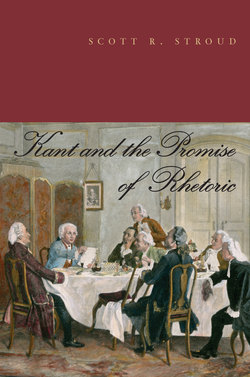Читать книгу Kant and the Promise of Rhetoric - Scott R. Stroud - Страница 8
На сайте Литреса книга снята с продажи.
ОглавлениеAcknowledgments
Writing on a thinker as notoriously complex as Kant requires an extensive network of support for an author. Whether or not the current work is worthy of Kant’s grand intellectual legacy, it is clear to me that I have been the recipient of much support and companionship throughout its creation. I must thank those who first formed—or perhaps put up with—my vague interests in Kant’s philosophy. These include Eleanor Wittrup, Jim Heffernan, Tom Leddy, Peter Hadreas, Richard Tieszen, and Rita Manning. I also must thank my Kant guru, Paul Guyer, for all the classes and discussions on Kant, as well as for his comments on the slew of papers that I wrote insisting on a connection between Kant and rhetoric. My reading of Kant is different from, but clearly indebted to, his influential reading. I also wish to thank those who helped me refine my thoughts on Kant and rhetoric in the pages of journals and on conference panels. I would like to thank Gina Ercolini, Samuel McCormick, Pat Gehrke, Nathan Crick, Paul Stob, Christopher Swift, Gerard Hauser, and Carolyn Miller for their comments, suggestions, and criticisms. Even though we each have different takes on the complex thinker that is Kant, my own reading certainly has been helped by hearing what these individuals found right and wrong about it. The first-rate staff at the Pennsylvania University Press also must be thanked. Kendra Boileau and my anonymous reviewers have been very helpful to me as this book came into its final form. I also must thank my supportive colleagues in communication studies at the University of Texas at Austin. I particularly wish to thank Barry Brummett and Rod Hart for moral and financial support during the semesters devoted to finalizing this book. This work has also benefited from the time and comments of my graduate students at Texas, including Danee Pye, Kristyn Goldberg, Jaishikha Nautiyal, Sakina Jangbar, Benjamin Gaddis, William Thomas, and Joseph Brentlinger.
My ideas on Kant, rhetoric, and ethics have been germinating for a while, and I have been fortunate to air some of these ideas in print in earlier forms. Some of the ideas in chapter 3 appeared in a preliminary form in the following article: “Connecting Right and Virtue in Kant’s Metaphysics of Morals,” Studies in Social and Political Thought 13 (2007): 2–28. Taylor and Francis is to be thanked for permission to include a revised and extended version of the following article in chapter 4: “Kant on Education and the Rhetorical Force of the Example,” Rhetoric Society Quarterly 41 (2011): 416–38. Pennsylvania State University Press is to be thanked for permission to include a revised and extended version of the following article as a portion of chapter 5: “Rhetoric and Moral Progress in Kant’s Ethical Community,” Philosophy and Rhetoric 38 (2005): 328–54. This project has benefited from the comments and criticisms that these earlier expositions have provoked. I thank the known editors and the unknown reviewers for their help in refining my reading of Kant.
As Kant describes, the autonomy of any agent (or author) is conditioned by and connected to a network of other individuals. Not all of these individuals are academics, but each has helped me in an important way. I must thank my family, in a range of states, for their constant support and encouragement. This book is dedicated to my wonderful parents, Sandra and Herman Stroud. They are not experts in Kant, so I’m sure they will wonder at much of this project. When that happens, I would simply remind them that this book is basically about what they already know: that the demand to treat others with respect and charity, while still trying to help them in the way we think best, is one of the most challenging tasks we face in our lives. They have done an excellent job at striking this balance, and I must thank them for allowing and helping me to become the sort of human who could explore the challenges of respect and love in the fashion represented by this book. Finally, I must thank my wife and fellow thinker, Natalie “Talia” Stroud. Talia has been my constant supporter when others have wondered why I would ever want to write on Kant, let alone connect him to a rhetorical tradition that seems so remote from his concerns. My work on Kant has been enhanced by the challenging questions posed by Talia, as well as by the inspirations of her parallel work on partisan forms of thought. Any errors in my reading of Kant are certainly my own, but much of what is valuable in this work is surely indebted to Talia’s ever-present support and encouragement.
